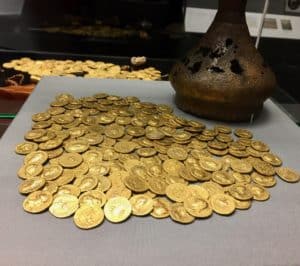 Over the years, tonnes of gold has been mined. Researchers, reporters/journalists, investors, as well as gold bullion dealers have been focused on tracking the estimated total amount of “overground” gold across the globe, the team at UK-based Minted notes.
Over the years, tonnes of gold has been mined. Researchers, reporters/journalists, investors, as well as gold bullion dealers have been focused on tracking the estimated total amount of “overground” gold across the globe, the team at UK-based Minted notes.
The Financial Conduct Authority approved Fintech firm writes in a blog post:
“Thus, the question still remains, where is it all stored? You’ve probably guessed it by now, so yes, the short straight answer to that question is ‘central banks.'”
The company further notes that the “68-foot cube” is quite often credited to “no other than investor Warren Buffet.” Well-known for talking about the advantages and disadvantages of gold investments, Buffett “argues that the total amount of mined gold could be moulded into a 68-foot cube.”
The Minted team added that this “created a buzz in the gold investment community of whether Buffett is right or not.” They also acknowledged that they can’t full “confirm his allegations but while doing our research, [they] were not surprised to find that there is more gold than commonly reported.”
The Minted team also shared that Thomson Reuters provided research that “claims there are 171,300 tonnes in circulation.” Meanwhile, the Golf Standard Institute has a significantly bigger estimate. According to their analysis, the market has over 2.5 million tonnes of gold.
The World Gold Council estimated back in 2019 that “all the gold ever mined, totaled 190,040 metric tons which account for $7.5 trillion.” Because of these wide-ranging estimates, we might never know “precisely how much gold there is, but the answer will remain A LOT,” the Minted team noted.
They added:
“Unlike foreign currencies, equities, or debt securities, gold’s value is not affected by economic crises. Thus, the precious metal is an essential part of many national central bank reserves which helps a country’s monetary supply to expand.”
While commenting on how global reserve banks have been managing gold, the company revealed:
“Many European nations (including the European Central Bank) have reduced their gold holdings over the past two decades, by around 15% when they sold a total of 1,885.3 tonnes. In spite of that, some European nations like Italy, Germany, and France still own some of the largest gold reserves. To add, Italy has not touched their gold at all over the past 20 years.”
In May 2014, the European Central Bank and 20 other European central banks “announced the signing of the fourth Central Bank Gold Agreement,” the Minted team noted.
This agreement declared that the “stated central banks won’t be selling significant amounts of gold,” the company added while noting that the agreement “ended in July of 2019 after five years, and it definitely has been successful as it brought stability to all aspects of the market from gold producers, to investors and consumers.”
And though the agreement has ended, the European Central Bank “confirmed that they still wouldn’t be selling significant amounts of gold as it’s very beneficial to their economy,” the Minted team wrote in their blog post.
The ECB has stated:
“The signatories confirm that gold remains an important element of global monetary reserves, as it continues to provide asset diversification benefits and none of them currently has plans to sell significant amounts of gold.”
Although large nations were attempting to protect their gold, smaller countries were “striving to increase their amount of precious metals reserves.”
The Minted team also mentioned that nations including Kazakhstan, Cambodia, Qatar, Uzbekistan, and Belarus have been buying large amounts of gold “relative to their GDP.” And while none of these countries is ranked in the top 50 by nominal GDP, their central bank reserves have been “greatly growing in value as a result of their gold accumulation over the past 20 years,” the Minted team confirmed while adding that in some countries such as Uzbekistan, they’re “headed on making gold production a key factor of their economies.”
According to Minted, gold can “make or break a country’s economy.”
They further noted:
“In fact, you can tell how healthy the economy is from the price of gold. The yellow metal even showed more dominance amid the Coronavirus crisis, as it was the only thing that saved some economies. And though countries have been working for years to stack up gold, let’s just say, they’re only getting started.”
It’s worth noting that Minted recently introduced their new savings app, which aims to make precious metals accessible to everyone.
The firm’s user-friendly app lets clients invest whatever amount they feel comfortable with, and people can withdraw their physical gold if they want.
Founded by Hamzah Almasyabi and Haroon Siddiq, Minted aims to tap into the national savings mindset and eliminate barriers to making investments in gold. Via the platform, savings plans are being offered from as low as £30 each month, with clients purchasing gold of the highest purity from an LBMA-approved delivery partner.
Minted also offers clients with free-of-cost insurance and the added option to maintain their gold for free in a high-security vault located in London.

